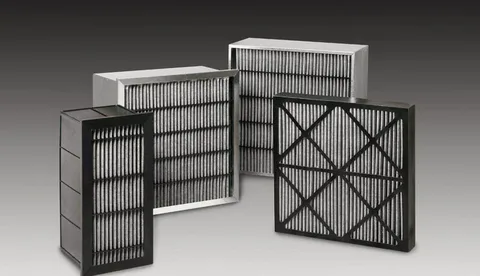Air Filter Buying Tips: Which Type is Best for Allergies, Pets, or Pollution?

Indoor air quality has a huge impact on how comfortable and healthy your home feels. For Canadian families, choosing the right air filter isn’t just about keeping dust away, it can also protect against allergies, pet dander, and outdoor pollutants that sneak inside. With so many different filter types available, it can be confusing to know which one is worth your investment. In this guide, we’ll explore how air filters work, the differences between the most common types, and how to decide which option best fits your household needs.
Why Air Filters Matter
Air filters are the first line of defense in your HVAC system. They capture particles from the air that circulates through your ductwork or indoor unit, preventing dust, allergens, and debris from building up in your equipment. A clean filter not only improves air quality but also helps your heating and cooling system run more efficiently. That means fewer repairs, lower bills, and a more comfortable home.
When allergies, pet smells, or city pollution start affecting daily comfort, the type of filter in use becomes especially important. Pairing it with the right air quality solutions keeps indoor air fresh and safe
Understanding MERV Ratings
Before comparing filter types, it’s important to understand the MERV rating system (Minimum Efficiency Reporting Value). This scale, ranging from 1 to 20, measures how effectively a filter captures particles.
- MERV 1–4: Basic dust and lint protection, but not ideal for allergies or health concerns.
- MERV 5–8: Good for general household needs, capturing mold spores and pet dander.
- MERV 9–12: Strong protection against finer particles, including pollen and some bacteria.
- MERV 13–16: Hospital-grade quality, capturing smoke, smog, and microscopic allergens.
Choosing too high a rating, however, can restrict airflow and strain your system. That’s why it’s best to balance efficiency with compatibility.
The Best Filters for Allergies
If someone in your household suffers from seasonal allergies or asthma, then filtration should be a top priority. Filters with a MERV rating between 11 and 13 are often the best balance, catching pollen, mold spores, and fine dust. For even stronger protection, HEPA filters (High Efficiency Particulate Air) can capture up to 99.97% of airborne particles as small as 0.3 microns.
However, not every HVAC system can handle the resistance of a HEPA filter. Homeowners with central systems may need professional guidance to ensure their equipment can manage it. In smaller spaces, ductless units can use specialized filters that provide similar protection without overwhelming the system.
The Best Filters for Pet Owners
Pets bring joy to the home, but they also bring hair, dander, and odors. For households with cats, dogs, or other furry companions, filters with MERV 8–12 are generally a good fit. They’re designed to capture pet dander particles while still allowing strong airflow.
Activated carbon filters can be especially helpful for tackling odors. These filters use a layer of carbon material to absorb gases and smells that a standard filter can’t handle. If you’ve ever worried about lingering pet odors when guests arrive, this upgrade can make your home smell fresher.
Another tip for pet households is to change filters more frequently. While most homes can replace filters every three months, pet owners may need to swap them out monthly to keep air fresh and systems efficient.
The Best Filters for Pollution and Smoke
In urban areas or places prone to wildfire smoke, outdoor air quality can quickly decline. Even with windows closed, pollutants seep into your home. For this situation, filters rated MERV 13 or higher are ideal. They capture fine particulate matter (PM2.5), the same type that can cause respiratory irritation when air quality alerts are in place.
For homes in cities, choosing a filter with both high efficiency and activated carbon can provide double protection, capturing particles while also reducing odors from vehicle exhaust or smog.
And remember, good filters work best alongside smart energy habits. Something as simple as adjusting how you circulate air in your home can help reduce costs.
How to Balance Cost and Efficiency
While high-MERV filters provide better protection, they also tend to cost more and may require more frequent changes. On the other hand, low-cost fiberglass filters protect your system but do little for health or comfort.
The key is to match the filter to your lifestyle. For a home without pets or allergy sufferers, a mid-range filter can do the job. But for families dealing with health concerns or living in areas with poor outdoor air quality, investing in a stronger filter is worth it.
Maintenance Tips to Extend Filter Life
No matter which filter you choose, regular maintenance is essential. A clogged filter can undo all the benefits by restricting airflow, straining your AC, and driving up energy bills. Most HVAC professionals recommend checking your filter monthly and replacing it at least every three months.
Simple upkeep not only keeps your indoor air fresher but also helps your cooling system run more efficiently for longer.
Choosing the right air filter isn’t just about comfort, it’s about protecting your health and extending the life of your HVAC system.
- For allergies and asthma, look for high-efficiency filters (MERV 11–13 or HEPA if your system allows).
- For pet households, balance efficiency with odor control using carbon-enhanced filters.
- For polluted or smoky environments, prioritize MERV 13+ filters to block fine particulates.
Ultimately, the best filter is one that matches your lifestyle, budget, and HVAC system’s capacity. By investing wisely, you’ll enjoy cleaner air, fewer allergens, and a healthier home environment all year long.
